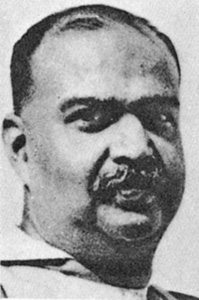Bharatiya Jana Sangh: Difference between revisions
m (1 revision imported) |
(origins) |
||
| Line 1: | Line 1: | ||
'''Bharatiya Jana Sangh''' was an [[India]]n right wing political party that existed from 1951 to 1977 and was the political arm of [[Rashtriya Swayamsevak Sangh]], a [[Hindutva|Hindu nationalist]] volunteer organisation. Later Jana Sangh succeeded by [[Bharatiya Janata Party]].<ref name="Low1968">{{citation|editor=Donald Anthony Low|title=Soundings in Modern South Asian History|url=https://books.google.com/books?id=WfD02m8q8eYC&pg=PA372|year=1968|publisher=University of California Press|pages=372–|id=GGKEY:6YPJXGZBWJQ}}</ref> | '''Bharatiya Jana Sangh''' was an [[India]]n right wing political party that existed from 1951 to 1977 and was the political arm of [[Rashtriya Swayamsevak Sangh]], a [[Hindutva|Hindu nationalist]] volunteer organisation. Later Jana Sangh succeeded by [[Bharatiya Janata Party]].<ref name="Low1968">{{citation|editor=Donald Anthony Low|title=Soundings in Modern South Asian History|url=https://books.google.com/books?id=WfD02m8q8eYC&pg=PA372|year=1968|publisher=University of California Press|pages=372–|id=GGKEY:6YPJXGZBWJQ}}</ref> | ||
==Origins== | |||
[[File:Syama Prasad Mookerjee.jpg|thumb|right|[[Syama Prasad Mukherjee]], founder of the Bharatiya Jana Sangh]] | |||
After 1949, members of the right-wing Hindu nationalist Rashtriya Swayamsevak Sangh (RSS) began to contemplate the formation of a political party to continue their work, begun in the days of the [[British Raj]], and take their ideology further. Around the same time, [[Syama Prasad Mukherjee]] left the [[Hindu Mahasabha]] political party that he had once led because of a disagreement with that party over permitting non-Hindu membership.{{sfn|Urmila Sharma|SK Sharma|2001|p=381}}{{sfn|Kedar Nath Kumar|1990|pp=20–21}}{{sfn|Islam|2006b|p=227}} The BJS was subsequently started by Mukherjee on 21 October 1951<ref>{{cite web|title=Founding of Jan Sangh|url=http://www.bjp.org/en/about-the-party/history?u=founder |website=www.bjp.org |access-date=25 January 2019}}</ref> in [[Delhi]], with the collaboration of the RSS, as a "nationalistic alternative" to the [[Indian National Congress|Congress Party]].<ref name=IEGuinha>{{cite news|title=Revive Jan Sangh -- BJP hardlines|url=http://expressindia.indianexpress.com/ie/daily/20000118/ina18037.html|access-date=11 October 2013|newspaper=[[The Indian Express]]|date=18 January 2000|author=Sharad Gupta|author2=Sanjiv Sinha|url-status=dead|archive-url=https://web.archive.org/web/20131012195411/http://expressindia.indianexpress.com/ie/daily/20000118/ina18037.html|archive-date=12 October 2013}}</ref> | |||
==References== | ==References== | ||
Revision as of 10:26, 5 April 2021
Bharatiya Jana Sangh was an Indian right wing political party that existed from 1951 to 1977 and was the political arm of Rashtriya Swayamsevak Sangh, a Hindu nationalist volunteer organisation. Later Jana Sangh succeeded by Bharatiya Janata Party.[1]
Origins

After 1949, members of the right-wing Hindu nationalist Rashtriya Swayamsevak Sangh (RSS) began to contemplate the formation of a political party to continue their work, begun in the days of the British Raj, and take their ideology further. Around the same time, Syama Prasad Mukherjee left the Hindu Mahasabha political party that he had once led because of a disagreement with that party over permitting non-Hindu membership.[2][3][4] The BJS was subsequently started by Mukherjee on 21 October 1951[5] in Delhi, with the collaboration of the RSS, as a "nationalistic alternative" to the Congress Party.[6]
References
- ↑ Donald Anthony Low, ed. (1968), Soundings in Modern South Asian History, University of California Press, pp. 372–, GGKEY:6YPJXGZBWJQ
- ↑ Urmila Sharma & SK Sharma 2001, p. 381.
- ↑ Kedar Nath Kumar 1990, pp. 20–21.
- ↑ Islam 2006b, p. 227.
- ↑ "Founding of Jan Sangh". www.bjp.org. Retrieved 25 January 2019.
- ↑ Sharad Gupta; Sanjiv Sinha (18 January 2000). "Revive Jan Sangh -- BJP hardlines". The Indian Express. Archived from the original on 12 October 2013. Retrieved 11 October 2013.